Sociology Graduate Spotlight
Nasim Koohi
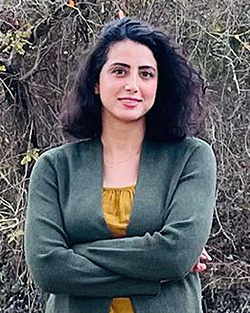
Name: Nasim Koohi
Graduation Date: Spring 2023
Graduate Committee: Dr. Amanda Baumle (Chair), Dr. Sheila Katz, Dr. Elizabeth Gregory
Thesis Description:
Employing a quantitative approach, my thesis examined the intersection of sexual
orientation and race/ethnicity to understand how college students experience interpersonal
sexual objectification (ISOE). Using primary data, I found that lesbian and bisexual
women report experiencing sexual objectification at higher levels. Similarly, compared
to Whites, Asian women report higher ISOE levels.
Where are you now?
After graduating from the UH sociology department, I worked for a year as a lab manager in the psychology department.
In this role, I trained undergraduate research assistants in the nuances of conducting
research, including how to conduct a literature review, survey design, and data collection.
In 2024, I applied to the Ph.D. program in Sociology at Rice University and was admitted.
In the fall of 2024, I began my doctoral program. My experience as a racial minority
and immigrant has inspired me to pursue research at the intersection of race/ethnicity
and immigration to examine health outcomes for multiple marginalized identities.
How has the program helped you?
Undoubtedly, earning my master’s degree in sociology from the University of Houston
has played a significant role in shaping my future academic journey. The supportive
atmosphere of the department created a safe and enjoyable space for learning and growth.
I deeply appreciate the supportive and encouraging faculty who value a diverse array
of research. The extensive training in both qualitative and quantitative methods has
equipped me to tackle a variety of research questions. As a research-active department,
I greatly benefited from collaborating with skilled faculty conducting cutting-edge
research. Receiving financial support, along with enjoying the warmth of Houston,
added to my positive experience.
Carlos Guajardo
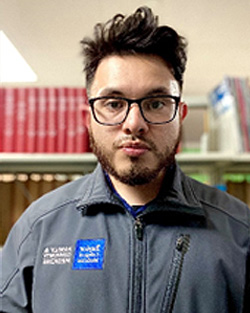
Name: Carlos Guajardo
Graduate Date: August 2023
Thesis Title: Catholic Latina Identities and Romantic Relationships
Thesis Description:
My thesis is a qualitative study that investigated how Catholic Latinas living in Houston negotiate their ethnic and religious cultural identities and comprehend romance within a cultural-sociology framework. Rather than passively accepting familial expectations, religious dictates, and ethnic prescriptions of gender, the respondents actively and creatively construct their own pragmatically useful understandings of what it means to be Catholic and Latina, and how those meanings influence their navigation of romantic relationships. Catholic and Latina identities are not discrete foundations of cultural resources but are inextricably linked, incorporating ethnoreligious dimensions to facilitate their romantic decisions. My research identified that Catholic Latinas engage in a rigorous cultural dialogue between tradition and modernity, especially when navigating familial and gendered expectations. Overall, my research aimed to understand how the nuanced deployments of culture influence Catholic Latinas in negotiating their identities when making romantic decisions. I found that these identities fluctuate depending on the contexts of environments and audiences.
Where are you now?
Currently, I am working at Baylor College of Medicine as a Research Assistant II (patient navigator) on two grants for colorectal and breast cancer. My duties as a patient navigator include contacting patients, providing and distributing accurate informational resources, conducting community outreach, and managing sensitive data (informed consent and implementing new project protocols). Occasionally, we collaborate with other teams on different projects, but always with the collective goal of preventative patient care and medical research.
How has the program helped you?
The University of Houston’s Sociology graduate program provided me with critical qualitative and quantitative skills that are essential for research-based jobs, particularly in the medical field in Houston. Through graduate courses that introduce students to designing project protocols and the importance of informed consent, the program prepares students not just for continuing education but for life post-graduation. In my experience, the most beneficial elements of the program are the qualitative and quantitative methods courses, simply because they directly translate into the field I currently work in. I spend a significant amount of time reviewing pre-designed questionnaires with patients and practicing active listening when consulting with patients in-person or electronically. These skills that I learned from my qualitative and quantitative methods courses that are applicable to various disciplines and fields post-graduation. Furthermore, the program establishes students into cohorts that become a vital professional network beyond the program. I am truly thankful for the professors in the program for mentoring and guiding us toward topics that we were passionate about. Go Coogs!
Nicole Hart

Name: Nicole Hart
Graduate Date: May 2023
Graduate Committee: Dr. Kathryn Freeman Anderson (chair), Dr. Zelma Oyarvide Tuthill, and Dr. Matthew Gallagher
Thesis Description:
I completed a quantitative thesis that focused on comparing Black Americans’ mental health coping mechanisms to other racial groups (Asians, Hispanics, and White). I utilized the Africultural Coping Systems Inventory to find common coping mechanisms and binary logistic regression models to examine out the nuances of different coping skills across different racial groups. My master's thesis is currently under review for publication in an academic journal.
Where are you now?
As of fall 2023, I am a Ph.D. student at the University of Chicago. I am currently studying inter-ethnic conflict/consensus by focusing on Houston’s minority small business owners through interviews and observations. I also work as an RA for an ongoing mixed methods project focusing on police training.
How has the program helped you?
Earning a master’s from UH provided me with the skill set and experience I needed to be a strong candidate for a top Ph.D. program. I was able to form relationships with faculty that gave way to excellent recommendations, all while learning how to be a successful, publishing sociologist. The best way to learn is to experience, and UH gave me that chance. To this day, I utilize the skills I learned from my time at UH while at the University of Chicago.
Angelica Lopez

Graduate Date: May 2020
Graduate Committee: Dr. Monserud (chair), Dr. Anderson, Dr. Narendorf
Thesis Description
For my thesis, I estimated a series of logistic regression models to examine the interplay
between generation status, acculturation and socioeconomic status on the perceived
need for mental health services among Asians and Latinos in the United States. The
findings indicate that among Asian Americans, the 1.5, 2.5 and third-generation are
significantly more likely to have previously perceived the need to use mental health
services. Notably, the level of English proficiency nullified the relationship between
generation status and perceived need for mental health services among Latinos.
Where are you now?
After graduation, I started working as a data analyst and community researcher for
the Sankofa Research Institute here in Houston. The Sankofa Research Institute uses
Community Based Participatory Research to engage with local Houston communities and
help them carry out research to address problems in their community. My role is to
help design and carry out data collection, analyze quantitative and qualitative findings
and present the data in a consumable way for community members.
In Fall 2021, I resumed my academic journey and started my Ph.D. in Sociology at Arizona State University. Asides from my work with Sankofa, I am a research and teaching assistant at ASU. My research assistantship focuses on the interplay between racial/ethnic identity and sleep.
How has the program helped you?
The UH sociology program provided me with extensive quantitative training. By the
end of the program, I was well versed with statistical software, quantitative methods
and my writing had improved. These assets have been indispensable in my job as a data
analyst and in my research at ASU. Lastly, I would like to add that the UH sociology
program has professors that are really supportive of students and their academic goals.
Dylan Simburger
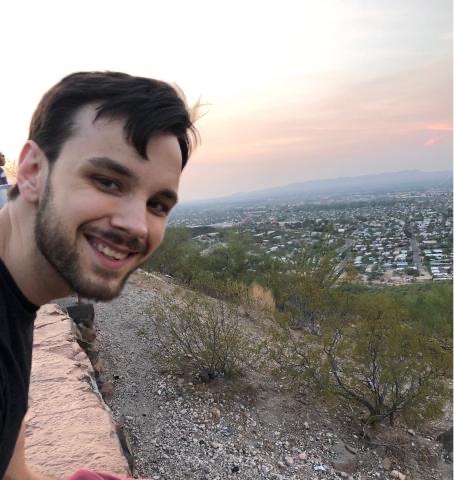
Graduate Date: May 2020
Graduate Committee: Dr. Kathryn Anderson (chair), Dr. Anthony G. Dworkin, Dr. Aimee Chin
Thesis Description
My thesis looked at how the upward, inter-generational socioeconomic mobility of Asian
Americans is moderated by the experiences in their communities. I used Rice University’s
Kinder Houston Area Survey to perform a series of OLS regressions that indicated that,
while second-generation Asian Americans were expected to make more than their first-generation
counterparts, this effect was moderated by their perception of racial and ethnic relations
in the Houston area. This effect was reinforced by the education of the respondents,
such that more education seemed to facilitate a better perception of racial and ethnic
relations. These finding line up with current theory on Asian Americans and assimilation
theory while also pointing towards new directions to measure the “successful” integration
of immigrant groups.
Where are you now?
I am now a Ph.D. student in the Sociology Department at the University of Arizona.
The program puts a heavy focus on methods training and empirical research. I am using
my time in the program to continue my research in immigrant populations and communities
and am increasingly trying to bring concepts of culture and identity back into studies
of immigrant assimilation and incorporation. I primarily use quantitative methods
to investigate this and am also beginning to incorporate computational techniques
into my research to help me explore new data sources.
How has the program helped you?
The UH Sociology program provides an excellent foundation that equips one with the
knowledge and tools to either continue their academic careers or enter more applied
sectors. Students are given the appropriate quantitative and qualitative training
to do worthwhile research as well as a space to think and develop their ideas with
extensive faculty support. The program also improved many of my other professional
skills: including writing, professional interaction, time management, and project
development. Overall, this program is supportive, knowledgeable, and worthwhile.
Fanni Farago
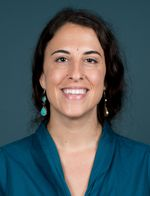
Graduation Date: December 2018
Graduate Committee: Dr. Maria Monserud (Chair), Dr. A. Gary Dworkin, Dr. Sheara Williams-Jennings
Thesis Title: Shaping Student Outcomes: The Relevance of Perceived Discrimination for 2nd Generation Minority Adolescents
Thesis Description
For my master’s thesis, I quantitatively investigated the relationship between different
sources of perceived discrimination and academic outcomes for second generation immigrant
adolescents belonging to various racial/ethnic groups. My goal was to better understand
how perceived societal, institutional and peer discrimination impacted immigrant youth’s
academic well-being. Unexpectedly, greater perceptions of peer discrimination predicted
improved academic performance and higher academic aspirations. As expected, stronger
perceived institutional discrimination predicted lower academic performance. I used
Garcia Coll and colleagues’ (1996) Integrative Model for the Study of Developmental
Competencies in Minority Children to contextualize findings from the perspective of
adaptive cultural strategies children of immigrants and their families develop to
cope with discrimination.
Where are you now?
I am a sociology doctoral student and Graduate Research Assistant (GRA) at George
Mason University. Since starting the program in fall 2019, I have enjoyed working
for two different research centers, the Center for Social Science Research (CSSR)
and the Institute for Immigration Research (IIR). As a GRA, I have had the opportunity
to develop my applied and academic research skills through various projects that required
quantitative or qualitative data collection, analysis, or reporting. For example,
I worked on the Medication-Assisted Treatment (MAT) Utilization Survey of Problem-Solving
Courts, a national survey examining the facilitators and barriers of MAT usage among
problem-solving courts. This study contributes to broader conversations about how
problem-solving courts can help mitigate the opioid crisis and better serve court
participants addicted to opioids or other substances.
How has the program helped you?
The UH Sociology program was the beginning of my professionalization as a sociologist.
In general, it provided me with a strong foundation of disciplinary knowledge and
practices (i.e., research, writing, and teaching), all of which facilitated my successful
transition into a PhD program. More specifically, I gained substantive research experience
through my thesis and summer research position; these experiences prepared me well
for my subsequent work as a GRA. Additionally, the rigorous thesis writing experience
gave me the confidence and know-how to work on various co-authored publications in
my first year of the PhD program. Finally, working as a Teaching Assistant (TA) for
two years was an immersive professionalization experience that helped me sharpen my
communication and teaching skills. Such skills come in handy given that I often work
on interdisciplinary research teams and collaborate with various non-research professionals,
folks who all want clear and simple communication and have zero patience for obscure,
sociological jargon, similar to my former undergraduate students.
Lindsay Oncken
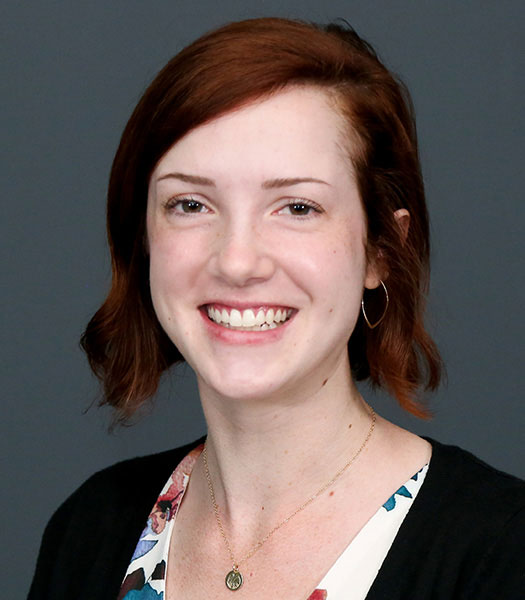
Graduate Date: August 2018
Graduate Committee: Dr. Kwan (chair), Dr. Anderson, and Dr. Hernandez
Thesis Description
For my thesis, I conducted in-depth interviews with local Meals on Wheels recipients
to better understand how low-income seniors’ social interaction impacts their ability
to develop resilience. I found that, in order to combat limitations to autonomy experienced
in old age, many seniors engage in social strategies that allow them to promote a
more agentive sense of self to others. I argued that being able to engage in these
strategies is a key mechanism by which social interaction promotes resilience among
the elderly.
Where are you now?
I recently started as an Associate Research Analyst with the Texas Association of
School Boards (TASB), an Austin-based nonprofit providing a wide range of services
to school districts throughout the state of Texas. In my role, I assist with research
projects, conduct data analysis, and write reports to help the various service providers
within TASB better understand and support school districts.
How has the program helped you?
The UH Sociology program equipped me with several concrete skills that were hugely
helpful during my job search. Having a firm knowledge of statistical analysis and
research processes allowed me to offer a unique and valuable skillset to my employers.
In addition, having solid teaching and writing experience showed employers that I
could make complex ideas digestible to non-experts—something that is especially
important in an applied research setting. Overall, the graduate program gave me the
skills, experience, and confidence to find a job that is intellectually challenging
and engaging.
